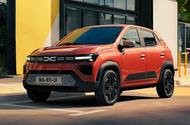The Spring has been given major improvements to interior quality and connectivity
Quality-raising revamp puts Dacia’s smallest EV hatch on course to launch in October
The Dacia Spring will finally head to UK dealers in the coming months to become the nation’s cheapest electric car, following a substantial overhaul inside and out aimed at sustaining strong European sales volumes.
The Spring was originally introduced in Europe in 2021 as a rebadged version of the Chinese-market Renault City K-ZE. Its low launch price of just €16,800 (£14,385 at today’s exchange rate) meant it quickly rose up the EV sales charts, and three years on, 140,000 Springs have been bought on the continent.
However, the original Spring was not imported to the UK – partly because it was “lacking a bit of modernity”, in the words of Dacia design chief David Durand.
Now, though, it has been heavily updated to rectify that, with major improvements to interior quality and connectivity, and it is due to hit the market imminently, priced from just above £17,000.
Inside, the outgoing car’s curved dashboard and piano black finish have been replaced by a more modern, rugged design in line with the new Duster.
Also gone is the old 7.0in infotainment display. Range-topping Extreme cars get the 10.1in touchscreen from the Duster in its place, which can be updated wirelessly without going into a dealer.
Lower-grade models rely on a smartphone app, which still provides on-the-go access to popular services such as Waze and Spotify.
Advanced driver assistance systems such as lane keeping assistance, advanced emergency braking and driver attention monitoring have also been added to the Spring. This is to ensure compliance with Europe’s new GSR2 safety regulations, but a physical ‘My Safety’ button provides quick access to the ADAS settings, should drivers wish to disable them.
Dacia’s new ‘Youclip’ accessory mounts appear on the centre console, dashboard and glovebox. These offer attachment points for amenities such as a phone cradle, cupholder and even a glovebox – useful as the Spring features a Fiat 500-style open shelf as standard.
It’s all change for the Spring’s exterior styling too. It gets a new-look front end that brings it into line with the Duster and the upcoming Bigster, featuring LED daytime-running lights and indicators on the grille. The rear gets thinner, Y-shaped lights, which are joined by a matt black plastic panel.
The cladding around the wheel arches and the lower section of the front and rear bumpers is left unpainted to cope better with any dents or scrapes incurred around town.
Mechanically, however, the new Spring is largely the same as before. A single electric motor sends either 44bhp or 64bhp through the front wheels, with the more powerful variant dispatching 0-62mph in a leisurely 13.7sec.
The small, 26.8kWh battery delivers a claimed range of more than 137 miles and is a key reason why the Spring weighs only 984kg – just 6kg more than the outgoing car. This means the Spring is still the only full-size EV sold in Europe that tips the scales at less than a tonne.
The 44bhp car can take charge at a maximum of 11kW (AC), while 64bhp cars get 30kW DC charging as standard. In Extreme cars – expected by Dacia to account for 65% of UK sales – the charger is also able to deliver power from the car’s battery to external sources, rated at 220V.
UK deliveries of the Spring will begin in October, with its sub-£18,000 price tag undercutting the £26,000 BYD Dolphin and the upcoming Citroën ë-C3, which will be roughly £23,000.
Q&A with Christophe Combre, Dacia Spring product leader
Will it always be feasible to build the Spring in China?
“We are in the near future [going to build it in China]. We have no doubt about that. In the history of Spring, it started from an existing vehicle, which was already made in China. So for us, it made a lot of sense to take it from there, in this ecosystem, because the suppliers are already there.”
Are you looking to expand the Spring’s target market?
“Our customer targets are completely in line with the existing Spring. It’s mostly people in Europe, in their fifties, looking for a second car because they need something practical for commuting and everyday business they have to attend. Most of the time, it’s a second car or maybe sometimes even a third car.
“We are actively pursuing to renew the needs of those customers and also to try to appeal to younger customers, who are no longer necessarily looking for a traditional means of mobility.”
Does the Spring’s success give you confidence in Dacia’s electric future?
“We are still studying that for the time being. This is the only electric car we have, and we are working on the electrification of the range, with HEVs [hybrids], for instance, coming on other models. We keep on thinking, but today this is our [only electric model].”





